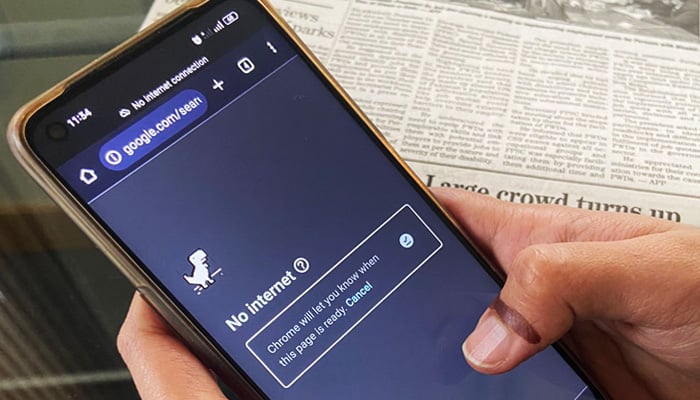Cellphone, internet services shutdown dent Pakistan's most expensive election
For more than 12 hours, the country witnessed disruptions in connectivity — affecting all
The caretaker government had assured Pakistanis that network connectivity would not be affected during the election day, but that promise was not fulfilled when, even before the clock struck 8am — the start of voting time — on February 8, mobile internet services were shut down “temporarily”.
The Ministry of Interior, eight minutes ahead of the beginning of the voting process said the cellular services across Pakistan would remain suspended as part of the “security measures”, noting that such measures were “inevitable”.
These general elections cost a whopping Rs42 billion, making them the most expensive in the country's history. This is 26% more than the 2018 elections. The increase is due to security and other arrangements by the Election Commission of Pakistan (ECP). Moreover, since more than 128 million people were voting, it was the biggest election.
This sudden change in the policy of disrupting connectivity troubled all the people linked to elections — voters, political actors, polling agents, observers, and reporters.
“The election commission had basically one job to do: conduct free and fair elections. On the day of the elections, they suspended or allowed the authorities to suspend the mobile services,” Benazir Shah, Geo Fact Check Editor, told Thenews.com.pk.
But despite pressure and criticism on the top polling body, Chief Election Commissioner (CEC) Sikandar Sultan Raja told reporters that the matter was not the “mandate” of the election regulator and it would not advise the ministry to restore the internet.
Disagreeing with the CEC, Shah said Section 8 of the Election Act empowers the ECP to issue directions to any organisation or the institution of the government to ensure honest, fair, and free elections, “which they failed to do”.
This wasn’t the first time that unannounced or unexpected connectivity issues have emerged. In the run-up to elections, the authorities had shut down internet services multiple times, citing technical glitches, but had assured no disruptions on the polling day.
Shah said mobile service suspension was a “big blunder” on the ECP’s part because, not only did it deprive the voters of their fundamental right of access to information, but also rendered candidates unable to communicate with their polling agents, cutting them off completely.
‘Tactic to potentially stop mobilisation’
This ‘sudden’ plan to cut off people from one another to ensure security also made it harder for people to travel as voters depend on the internet for locations and the ECP’s 8300 SMS services to check for their polling details.
Communication specialist Farhad Jarral told Thenews.com.pk that the unprecedented internet shutdown on the polling day not only limited the citizens’ access to information, “but also voters’ abilities to confirm their voting details through SMS”.
“This has to be a tactic to potentially stop the mobilisation of voters, I and many other friends and family faced difficulties in communication and accessing election-related information,” Jarral, the Islambaad-based comms specialist, said.
Fahim Patel, an Islambad-based journalist, noted that several of the people he knows faced trouble as they could not access real-time information, and to top it off, the polling staff was also “untrained”.
“Some people did not know where their polling station was and they were banking on Google Maps to reach their locations,” Patel said, adding that since public transport was not available, people could also not reach their destinations via online transportation services — which are very common among the masses.
Lahore-based doctor Osama Zia told Thenews.com.pk that the suspension of mobile services and phone connectivity hampers the ability of voters to report irregularities and potential cases of rigging in real-time.
“Without proper means of communication, it becomes difficult to address and rectify issues promptly, potentially undermining the fairness and transparency of the elections. Similarly the internet disruption impeded people's ability to use maps and transportation apps like for commuting to their respective polling stations,” he added.
Media blocks and accountability
The fourth pillar of the state — the media — also faced several roadblocks in the collection of information and dissemination of results post-balloting.
Geo News’ Karachi-based reporter Kiran Khan said the journalists faced major issues in gathering information. “We got some videos later on, but had the [connectivity] been there, it would have been easier.”
Backing the same, Jarral said: “It affected news organisations, journalists, and election ovservers’ abilities to cover the event.”
Waqas Angaria, Geo News’ Karachi-based reporter, also noted that his plans of dissemination of results and providing real-time updates to the channel failed due to the disruption.
“It was an unannounced shutdown which the government has to be held accountable for - depriving the voters this basic right to information and vote. I am worried that the overall effect of this evil tactic by the government has resulted into a notable decrease in voter turnout compared to previous elections,” Jaral added.
Thenews.com.pk reached out to caretaker Information Minister Murtaza Solangi for a comment, but he did not respond until the filing of this report and neither was connectivity restored across the nation.
However, the government started restoring signals in some pockets at midnight.
-
Security forces gun down 30 terrorists in multiple IBOs in KP: ISPR
-
MQM-P calls for new province in Sindh
-
US report validates Pakistan military edge over India: PM
-
Banned TTP poses serious threat to Pakistan security: UNSC panel
-
CM Afridi clarifies remarks on by-poll after ECP requests army deployment
-
Dubai sees 3.2m Pakistani passengers in 2025 as airport sets new milestone
-
Security forces kill 23 Indian proxy terrorists in KP's Kurram
-
Pakistan to construct island to boost oil exploration: report












